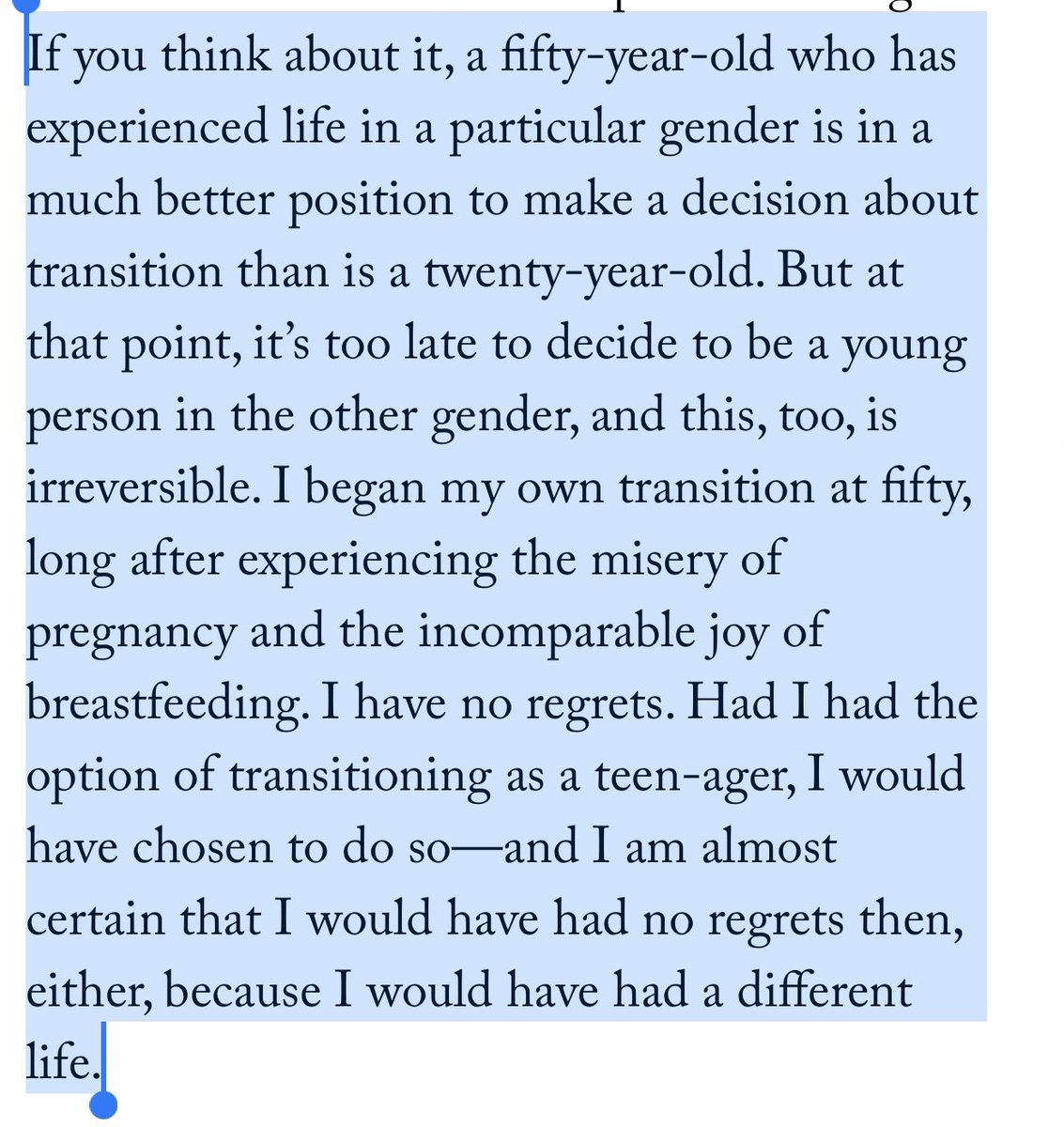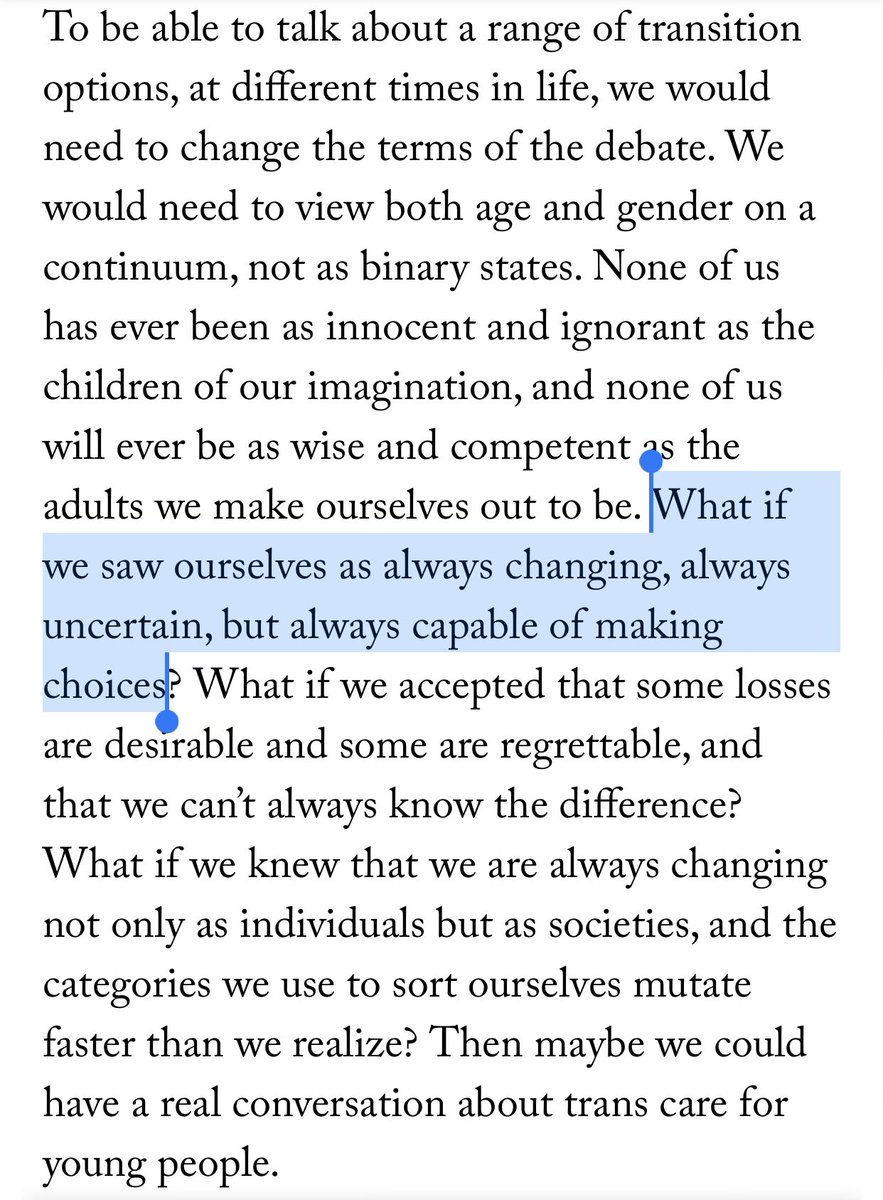The @mashagessen essay itself was no worse than what passes for common opinion, in my view. What is really striking, and truly disgusting, is the degree to which puberty blockers (which delay irreversible puberty) have somehow come to signify the *irreversible*.
So let’s say this carefully, so that everyone can follow. There are two points to remember:
(1) Only small minority of trans-identifying children receive pharmaceutical treatment.
(2) Blockers *delay* irreversible changes to the body. They do not cause them.
(1) Only small minority of trans-identifying children receive pharmaceutical treatment.
(2) Blockers *delay* irreversible changes to the body. They do not cause them.
The Bell decision essentially decided that that taking blockers *causes* adults to transition. That claim, I’ve argued, was utterly unjustifiable by the evidence gathered, and is also self-evidentially logically incoherent. https://foreignpolicy.com/2020/12/15/uk-transphobia-transgender-court-ruling-puberty-blockers/
A journalist named Jessie Single, meanwhile, tried to eviscerate my article by, bizarrely, getting a couple of facts wrong, but then getting very angry at me, and somehow persuading his readers that he’d defeated me in mortal combat. Please read him here: https://jessesingal.substack.com/p/a-response-to-foreign-policys-deeply
And please read my response here. https://twitter.com/graceelavery/status/1340001379998416903?s=20
How did a treatment that *delays* irreversible bodily changes to young people who may not know what they want, and is not itself irreversible in any physical sense,* become associated in the public mind with irreversibility?
*minor caveat below!
*minor caveat below!
The caveat: there is some evidence to suggest that puberty blockers may lead to long term risk of decreased bone density. ***This is not what anyone ever means when they talk about irreversibility: not Abigail Shrier, not Keira Bell, and not Masha Gessen.***
So how is a treatment that isn’t prescribed often, and very rarely in the absence of social transition, and whose only function is keeps trans kids options open consistently represented as though it *reduced* options? I don’t know. Ask the frauds who have perpetuated these lies.
Gessen isn’t one of them. They are stepping into a media and cultural environment that has been poisoned, and they don’t quite have the courage to pursue their insights through the garbage that has been piled on top of it.
Unlike Gessen, I’m not a non-binary trans person—I’m (therefore?) not compelled by their ideas about the generalizable indeterminacy of gender. But like them, I started transition after puberty, and I appreciated what they had to say about “regret.”
In a sense, the notion that any decision is “reversible” is based on an extreme form of egoism which reduces everything to regret: nothing can actually be undone—decisions can only be regretted. These things are importantly different, as Gessen notes.
I’ll remember this when next I see J. K. Rowling (or Phoebe Waller-Bridge, or whomever) bemoaning that, if they’d been teenagers now, they might’ve transitioned. Statistically, ofc, that’s unlikely. The point is that JKR and PWB take for granted that it would have been worse.
But why? Why would it have been worse? Trans people are out here living lives full of the usual mixture of gratitude and—of course—regret. You can’t stop people from regretting things. All you can do is ensure that the things we grow to regret are decisions that we made ourselves
Lastly, this is *not* my field. I’m a scholar of Victorian culture. If you want to know about the Wilde trials, ask me. If you’ve questions about trans children, ask @gp_jls. You can start by buying her book. It is the best thing on the topic: https://amzn.to/2LDR8C4

 Read on Twitter
Read on Twitter



